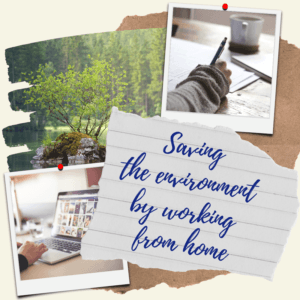
Working from home wasn’t exactly how my paid career started. At the age of 15, I delivered the local newspaper to people’s homes. The day started at 06:00 hours. Through rain, snow, and sometimes sunshine.
I very much enjoyed the freedom and the exercise. In fact, I never stopped walking after that. Never stopped working either.
In those days, my newspaper route was just the beginning of a very long day. First the newspaper delivery, a quick breakfast at home, to school for the remainder of the day. Back from school, homework until late at night. At 06:00 hours the routine started all over again.
Some of the links are affiliate links. As an affiliate associate, we earn a commission when you purchase any of the products offered through the shared links at no extra cost for you. This helps us maintain this website.
Table of contents
Milking cows

When I left school and started a daytime paid job, nobody ever talked about working from home. Although it must have been a very common practice already in those days. Through Hannie, I was introduced to artists who usually worked at home. Some of them also had part-time jobs teaching.
I already had met farmers. But is working on your land, working from home? Cows were in the barn next to the house. Is milking those cows, working from home? Confusing. My father never worked at home. My mother worked at home all day.
The International Labor Organization distinguishes three types of working from home: industrial homework, telework, and home-based digital platform work. No farm work in those types. Only when a farmer makes artisanal products at home can it be assumed as industrial homework.
Outsourced
Telework is what all the workers currently do at home because they had to flee the office because of the virus. There are people who did this already on a regular basis before the pandemic. When I was a researcher and consultant for years I, on and off, worked from home. Sometimes all day, sometimes only a few hours.

Many call centers outsource their work to people who work from home (‘digital platform’ – homework). These home workers perform services to the customers of, usually large, companies around the world. These workers are what is framed as ‘footloose’.
Meaning that they can work anywhere, as long as their wages are low and no social security costs are involved. This is why most of the ‘industrial’ and ‘digital platform’ homework can be found in Asia, Africa, and South America. Industrial homework also transferred to these regions together with the factories of low-cost industrial work.
Flexibility
In 2019 (before the pandemic) working from home covered almost 8% of the total employment worldwide. Of all home-workers in the world, some 65% are stationed in Asia and the Pacific.
In high-income countries, telework employees count for the largest number of home-workers. This is because 53% of the occupations in high-income countries are managerial, professional, and technical. In middle- and low-income countries this is 31% and 12%, respectively.
Almost 60% of the home-workers are women, an estimated 147 million in 2019. They combine their job with household tasks, and care for children, and often also parents and grandparents. This is why it is no surprise that most home workers favor the flexibility of homework. As a consequence, household work, also a type of homework, for most women ends up in an extension of the working day.
Moreover, all over the world household tasks and care work are still predominantly performed by women, who are never paid for this job. Even homework is defined by the gender roles in families and society. However, for disabled persons, homework is often the only way to have work at all.
Then there was the pandemic

During the pandemic, the number of people working from home increased. In 2020 European study, already executed during the first month of the lockdown, revealed six key factors indicating the advantages and disadvantages of homework.
The positive experiences, the advantages, prevailed. There are some interesting differences given gender, number of children at home, age, and managers versus employees.
Advantages
There are 3 advantages of working from home. The first refers to the balance between work and life. People prefer the atmosphere at home, save on travel time, enjoy breaking habits and routines, and experience an improvement in their social life.
The second advantage refers to improved work efficiency: fewer long meetings, more variety of work, and improved work focus.
The third advantage is greater work control. The most important control factor is that nobody looks over your shoulder anymore. Positive is also that people can take a break whenever they want and can eat and drink their own food.
Disadvantages
There are also 3 disadvantages of working from home. The so-called home-office constraints are the first and most important. Some of them are rather peculiar. Some people say that they miss the opportunity to go out of the home, for example for exercise. But when no one looks over your shoulder anymore, who cares?
Some miss the food at work. Why don’t they try to improve their food at home? Others miss their routines. Don’t they have routines at home?
More problematic is the lack of social contacts with colleagues, sitting behind the computer too much, and being disturbed by other house members.
The second most important disadvantage relates to work uncertainties. Some people are afraid there is not enough work, don’t know what kind of work they should do, the work they do is not interesting, and the financial burden for their employer is too high. I think people are justifiably afraid they will lose their job.
The third type of disadvantage is inadequate tools. People lack the necessary equipment, documents, internet security, and data. Some tasks people can’t perform at home.

Stress reduction
The most interesting difference, at least to me, of the European study, is that women and men who had children under the age of 15, felt more comfortable with their homework. Despite the fact that they were distracted more and more often by their children.
Other studies found that homework reduced stress, and increased mental health and feelings of well-being. The downside was that people felt less productive. Although this is probably a side effect of reduced stress.
Working from home is valued more
Of course, there are also many more collective advantages of homework. Less mobility means less pollution. Commuting from home to work and back is a substantial contributor to carbon dioxide emissions. Working from home is a contribution to a more sustainable lifestyle.
The problem is that most employees, employers, and politicians believe that face-to-face contact at work is essential. Although for many employees their motives for face-to-face contact at work are predominantly social. What these employees actually discovered is that more variety between home and office work is better for them and for the office.
Overall most people started to like working at home, more and more. What is important is that we try to balance the different concerns regarding the balance between work, family, and the environment. When we need to stop climate change by commuting less, working from home is a favorable price many people want to pay.
What are your experiences with working from home? Please tell us in the comment box below.


It really comes down to the kind of work it has to be done. There are some jobs that require interaction between colleagues and working from home is not easy. Jobs that require you to work as a team and have frequent interactions with multiple people at once make remote work almost impossible to coordinate. On the other hand for some jobs working from home is really vastly superior and I can spend a whole day explaining the benefits of it. In the end I believe that for most situations working from home has more pluses than minuses. You just need to know how to do it right.
Hi Stratos,
You are right. Many jobs require specialized working environments. Cars and planes are built in highly complicated working environments. Police officers and firemen and -women are specifically not supposed to work at home.
To grow your own food at home is nice and rewarding, but from my own experience, I know that when you live in an apartment block, the amount you can grow yourself is extremely limited. Supermarkets are convenient. Farmers work their land, not from home.
Moreover, there are jobs at home that need specialized support. When one of our many household appliances is out of order, we need to ask a repairman to come to the house. When the roof leaks, I cannot repair it.
I favor being on the road, commuting, going to appointments, see and talk people, as much as I favor working from home. To do this right is a huge responsibility.
Thank you for your comment.
Regards,
Tom
For me working from home is a huge blessing. Having to deal with anxiety on a day to day basis I just couldn’t cope with being in an office for 6+ hours, Monday through Friday. My freelance graphic gig pays more than I used to make and I get to spend my day with my fiance and our dogs #DoesntGetAnyBetter
Hi Ava,
Working from home can indeed be a huge blessing. Provided of course, as you explain, that we can produce an income working from home.
And the perks are indeed we can spend the day more and more with those we love and that we can map the day as we see fit.
It’s also important, as perhaps in your case, that we can make appointments with clients and colleagues at moments which better suit us. The exchange of ideas and gossip with others seems to be an essential part of our social lives. So these should not be neglected.
Thank you for your comment. For now, stay safe, stay healthy.
Regards,
Tom
This pandemic has been truly awful but at least some good seems to come out of it. I’ve already read about big tech companies wanting to incorporate working from home, let’s hope other companies follow suit. With Iceland successfully testing the 4-day workweek things definitely look a lot less gloomy.
Hi Zoey,
Perhaps it is still too early to determine whether some good comes out of the pandemic. There are many employees who never will be able to work from home. Predominantly those in essential jobs, such as public transportation, hospital staff, garbage collectors etcetera.
The interesting thing with the 4-day work week is what it will do with those essential workers. They are paid out of the taxpayers’ money. Fewer hours of work, against the same pay? This will put the bill square in the taxpayers’ wallets.
For now, stay safe, stay healthy.
Regards,
Tom
Hi Tom, I love your thought-provoking article. Working from home is something I definitely enjoy very much, but I am still working as a nurse, and I am traveling from house to house caring for the clients. Actually, something that I loved to do for years.
However, with the opportunity to work from home writing articles for my blogs, I have noticed that this lifestyle is my favorite one, especially I eat better and take better care of myself. The stress level at my nursing work is unbelievably high and certainly unhealthy.
Working from home is providing such a beautiful atmosphere for me that I always would prefer to work from home, a reason for me to build up an online business where I can create enough income to stop the nursing job.
I believe even working on a farm feels better for me than working in an office or hospital. The idea of creating something with my hands, growing vegetables, working in the garden or farm gives me a content, peaceful feeling. I already grow vegetables, but I still work as a nurse. Thank you very much, Tom! Excellent article!:)
Hi Sylvia,
You’re right. As I have explained in another reply to a comment, there are many professionals who will never be able to work from home.
You’re part of the many home-care workers. A type of job that’s by definition performed in somebody else’s home. With the growing number of elderly, this is a key job.
And indeed, it is a stressful and, because of that, unhealthy job. It is also a highly skilled job. This requires a lot of medical knowledge and vast experience to be able to perform the right procedures and a lot of psychological understanding. It is also gratifying.
Given that it’s a stressful job, I understand why you feel better working on a farm. Farming is outside in the open air. You create something new, which you can enjoy. Let’s hope you can shift more and more into your farming job.
Thank you for your comment and compliments.
Stay safe, stay healthy.
Regards,
Tom